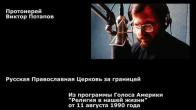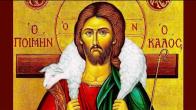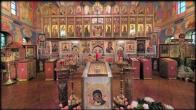ABOUT ORTHODOXY
You are here
The Parable of the Treasure Hid in the Field
If the parable of the leaven spoke of the hidden, transfiguring action of the Gospel preaching and the grace of God on separate individuals, the next parable after it, that of the treasure hid in the field, tells of the animation and joy which a man experiences without fail when Divine grace touches his heart. The Apostle Matthew alone has preserved this parable for us:
…the kingdom of heaven is like unto treasure hid in a field; the which when a man hath found, he hideth, and for joy thereof goeth and selleth all that he hath, and buyeth that field (Matthew 13:44).
The parable of the treasure hid in the field shows the greatest worth not to be compared with anything else of the grace of the Kingdom of God, for the sake of which one ought to sacrifice all earthly goods in order to obtain this treasure.
In antiquity, there was a practice of hiding one's treasures in a secret place in time of war or in a period of national calamity, so that it would be possible to find them later. Not infrequently it happened that some one else would find this place and make use of the treasure as if it were his own. It is about such a treasure-trove that Christ speaks in His parable.
In the parable of the treasure, a man working and tilling a field finds a treasure hidden in it. He rejoices at the find, but keeps it secret, and hoping to make use of it, he carefully hides it again in the field, so that no one else would find the treasure; and he goes and sells everything that he possesses and buys the field. Now he is the owner of the field and has a right to the treasure.
By the treasure, Christ has in view the Gospel and the moral life which it preaches, and which is supported by the grace of God abiding in the Church. The Gospel is a genuine treasure, in comparison with which all earthly goods are worthless. The Gospel is better than gold and silver, dearer than the whole world. A man can obtain the whole world, but without a moral life in accordance with the Gospel, he is nothing. On the contrary rich is he who follows the Gospel, although in everything else he might be poor.
But the Gospel is hidden and unknown to him who only listens with his ears to the good tidings of Christ, and to whose heart they do not reach. Perhaps the man of the parable had passed by that place hundreds of times where for many years the treasure lay, not suspecting that it was so close, till he discovered it. Precisely also, many listen to the Gospel for years and do not see the treasure in it, till it penetrates into their heart, thanks to the word of a pastor or spiritual friend.
When the Gospel touches the heart, only then is the moral reconstruction of a man possible. When this occurs, everything else, except for the soul, loses its importance, for the Good Tidings of salvation through Jesus Christ are reckoned as more important than everything. The man, about whom the parable speaks, sold everything that he possessed and bought the field where lay the treasure. Saint Gregory the Dialogist writes concerning at what price the Heavenly Treasure is obtained: "No fixed price exists for it. Every man must give up everything that he possesses for it. The Apostle Peter gave up his nets and received the Kingdom of Heaven. The widow gave up two mites. He who has millions let him give up millions, and he who has nothing let him give up his will."
Blessed, eternal life is hidden in the treasure of the Gospel. It is only necessary to find the treasure in order to make use of it. But where is one to seek it; in which field? Here is how Metropolitan Philaret (Drozdov) of Moscow answers this, with his characteristic eloquence:
"In many places! For example, in the field of solitude and reverent silence, in the field of chastity and abstinence: only spare nothing in order to gain possession of such a field, and thou shalt find the treasure. But a field particularly close and accessible for all," he continues, "is that in which the treasure of grace is secretly placed, that is, the Church. What a treasure is hidden in her sacred assemblies! In them is hidden the presence of Christ the Lord Himself, and in Him are hid all the treasures of wisdom and knowledge (Colossians 2:3), as well as the treasures of all other gifts spiritual and Divine. What a treasure there is in the prayers and doxologies of the Church! In them breathes the grace of the Prophets, the Apostles and the saints; still more, in them the Holy Spirit Himself maketh intercession for us with groanings which cannot be uttered (Romans 8:26). What a treasure there is in the readings of the Gospel! The same power, which, proceeding forth in Christ's word, cast out demons, healed infirmities, raised the dead and enlightened with the Divine light, now too abides in His word, in His Gospel. What a treasure there is in the Mysteries, and especially in the Mystery of the Body and Blood of the Lord! In it there is hidden eternal life with its inscrutable good things, in accordance with that which was said by the Lord: Whoso eateth my flesh, and drinketh my blood, hath eternal life (John 6:54). One needs only to know how to use such treasures, and for this it is necessary to sell, that is, to scorn, to reject all that thou hast, namely pleasing thyself, thy passions, thy depraved habits, thy carnal desires, thy laziness, thine inattentiveness, thy dissipation. An even closer field of treasure is our inner man. The depth in which the treasure is hid signifies the heart of man. Herein, the Spirit of God breathed invisibly in the Mystery of Baptism, and by His breath introduced new life from God. And so, treasure is put into our field, but has each of us found it? If we bury this hidden treasure deeper and deeper under the dung and refuse of vain, impure and iniquitous thoughts and deeds, then our treasure lies without being used, our spiritual life is embryonic or in a faint."
The man who found the treasure in the field hid it in order not to lose it. For spiritual life this means the following: He who is proud of the gifts of grace, such a one, because of his pride, will be deprived of the treasure found by him. In a similar manner, a member of the Church also, who has received the grace of God, should guard it in his soul in humility. All the same, a humble man, rejoicing in the Lord, does not start to boast before everyone, but will go to a man close to him in spirit, in order to share his joy and his wealth. Here is how Blessed Augustine writes about this joy, about his conversion to Christ: "How suddenly it became pleasant for me to do without worthless pastimes, and I with joy left off that which previously I had feared to lose! For Thou didst remove them far from me, and Thou, the true and highest Joy, Thyself didst dwell in me, O Sweetest of all joys!"
And let us do the same.
©V. Potapov
PARISH LIFE
Address of our Cathedral
Subscribe to our mailing list
While all the materials on this site are copyrighted, you may use them freely as long as you treat them
with respect and provide attribution on the Russian Orthodox Cathedral of St.John the Baptist of Washington DC.









